SWEDISH SOUTH ASIAN STUDIES NETWORK
Department of Peace and Conflict Research, Uppsala University:
Postal address: Box 514, SE-751 20 Uppsala
Visiting address: Gamla Torget 3
Web page: http://www.pcr.uu.se/
Contact persons:
Professor Peter Wallensteen,
phone: +46 (0)18 4712352
Professor Ashok Swain,
phone: +46 (0)18 4717653
The Department was established in 1971 to conduct research
and offer courses in peace and conflict studies. At present some 200-300
students are enrolled every academic year. The training offered includes
an undergraduate and a PhD programme as well as advanced programmes and
special seminars.
Information on the courses at the department.
Several PhD projects are in the field of conflict resolution, as well
as interdisciplinary projects dealing with conflict resolution in various
parts of the World, including South Asia.
The department also runs the Uppsala
Conflict Data Program, which continuously collects data on armed conflict.
Statistics on major armed conflicts has been published in the SIPRI Yearbook
since 1988, in the Journal of Peace Research since 1993 and in the Human Security Report/Brief since 2005. The Deparment’s States in Armed Conflict is an annual publication.
Ongoing research connected to South Asia:
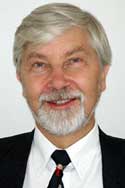 Professor Peter Wallensteen, Dag Hammarskjöld Professor of Peace and Conflict Research and the Richard G Starmann Sr Research Professor at the University of Notre Dame, Indiana, USA,
is mainly involved in work on conflict resolution, peace-building and sanctioning worldwide, but also
specifically regarding South Asia. He is doing research on conflict trends,
the UN system and conflict resolution, conflict prevention, durable peace
agreements, and implementation of sanctions. He is directing the
Uppsala Conflict Data Program. Personal
home page.
Professor Peter Wallensteen, Dag Hammarskjöld Professor of Peace and Conflict Research and the Richard G Starmann Sr Research Professor at the University of Notre Dame, Indiana, USA,
is mainly involved in work on conflict resolution, peace-building and sanctioning worldwide, but also
specifically regarding South Asia. He is doing research on conflict trends,
the UN system and conflict resolution, conflict prevention, durable peace
agreements, and implementation of sanctions. He is directing the
Uppsala Conflict Data Program. Personal
home page.
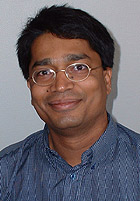 Professor Ashok Swain
is the Director of the Uppsala
University Programme of International Studies since 1998. This international
programme is an inter-faculty collaboration of Uppsala University and
it offers a Master’s Degree. He lectures on Global Environmental
Politics; Environmental scarcity and humanitarian emergency; Forced migration;
Conflicts and cooperation over renewable natural resources; International
water management; Democratic development in developing regions; and Research
Methodology. Personal
homepage.
Professor Ashok Swain
is the Director of the Uppsala
University Programme of International Studies since 1998. This international
programme is an inter-faculty collaboration of Uppsala University and
it offers a Master’s Degree. He lectures on Global Environmental
Politics; Environmental scarcity and humanitarian emergency; Forced migration;
Conflicts and cooperation over renewable natural resources; International
water management; Democratic development in developing regions; and Research
Methodology. Personal
homepage.
His research interests are in the same fields. He has e g worked on a
project studying environmentally induced population migration and native-migrant
conflicts in South Asia, but currently his research is mostly oriented
towards South-East Asia.
In November 2003 he got a Swedish Research Council Project grant for Research
within Humanities and Social Sciences for a one-year project on ”Prevention
of Violent Conflicts through Respect for Minority Rights: Democracy and
International Peace and Security”. See
full list of South Asia related Swedish Research Council grants 2003.
In November 2004 he received a one-year research grant from Sida/SAREC
for a project on ”Conserving Forest
or Conceiving Protest? Social Networks and anti-Protected Areas Movements
in India”. In November 2005 he then recieved
SEK 1 Million as additional funding for two years (2006-07) from Sida/SAREC
for this project. More
information.
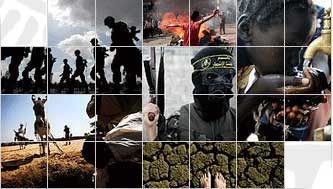 Professor Swain has also been Coordinator for the Sida/SAREC
funded ”Swedish
Network of Peace, Conlict and Development Research", established
in 2005, but from 2008 the position as coordinator of the network has been taken over by Dr. Ramses Amer, Senior Research Fellow at the Department of Oriental Languages, Stockholm University. More information on the Peace Network.
Professor Swain has also been Coordinator for the Sida/SAREC
funded ”Swedish
Network of Peace, Conlict and Development Research", established
in 2005, but from 2008 the position as coordinator of the network has been taken over by Dr. Ramses Amer, Senior Research Fellow at the Department of Oriental Languages, Stockholm University. More information on the Peace Network.
Besides his position as Professor of Peace and Conflict Research, Prof. Ashok Swain has also assumed the responsibility as the Director of the Uppsala Center for Sustainable Development (CSD) from 1 September 2008. CSD was established in January 2007, as a centre consisting of the three units, The Baltic University Programme (BUP), Centre for Environment and Development Studies (CEMUS) and The Collegium for Development Studies (Collegium), and organised under the Faculty of Science and Technology at Uppsala University as a joint centre for Uppsala University and the Swedish University of Africultural Sciences (SLU), Uppsala.
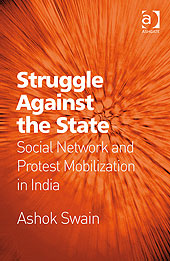 In August 2010, Ashok Swain published a new book, entitled ”Struggle Against the State.
Social Network and Protest Mobilization in India”. In the book, published by Ashgate, he demonstrates how displaced people mobilize to protest with the help of their social networks. Studying protests against large industrial and development projects, Swain compares the mobilization process between a traditionally protest rich and a protest poor region in India to explain how social network structures are a key component to understand this variation. He reveals how improved mobilization capability coincides with their evolving social network structure thanks to recent exposure to external actors like religious missionaries and radical left activists.
In August 2010, Ashok Swain published a new book, entitled ”Struggle Against the State.
Social Network and Protest Mobilization in India”. In the book, published by Ashgate, he demonstrates how displaced people mobilize to protest with the help of their social networks. Studying protests against large industrial and development projects, Swain compares the mobilization process between a traditionally protest rich and a protest poor region in India to explain how social network structures are a key component to understand this variation. He reveals how improved mobilization capability coincides with their evolving social network structure thanks to recent exposure to external actors like religious missionaries and radical left activists.
The in-depth examination of the existing literature on social mobilization and extensive fieldwork conducted in India make this book a well-organized and useful resource to analyze protest mobilization in developing regions. More information about the book. ![]()
In October 2010, Prof. Swain was awarded a major grant from Sida/SAREC’s Developing Country Research Council, this time SEK 2.7 m for a research project over three years (2011-13). The project is entitled ”Changing Parameters for Hydropolitics in Light of Global Climate Change: The Governance of Transboundary Waters to meet the Water Crisis”. More information. ![]()
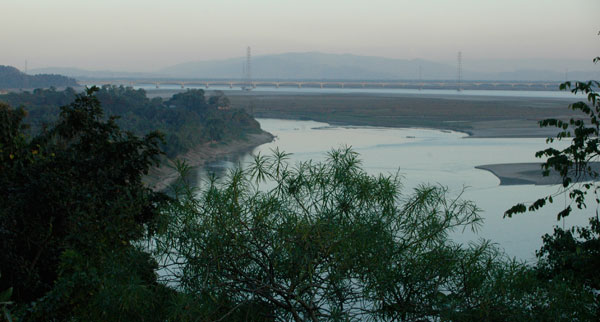 This project has five case studies, and one of them deals with the Ganges-Brahmaputra River system in South Asia. (Photo of Brahmaputra river in Assam, by Lars Eklund).
This project has five case studies, and one of them deals with the Ganges-Brahmaputra River system in South Asia. (Photo of Brahmaputra river in Assam, by Lars Eklund).
The collaborating Swedish resarchers are Prof. Joakim Öjendal and Stina Hansson from School of Global Studies, Gothenburg University (working on the Mekong and the Niger rivers respectively); and Associate Professor Anders Jägerskog from Stockholm International Water Institute, SIWI (working on the Middle East).
Project abstract: The focus of the proposed research project is the problematique of good governance of transboundary water
resources. The justification is the critical development-need for enhancing knowledge on how to govern these
resources in the face of increasing uncertainties, in particular in relation to global climate change (GCC).
The
context is the complex global development agenda, the growing scarcity of water, and GCC-related uncertainties.
The research problem it addresses is the inadequacy with a series of strategically situated in-depth case studies at
its core, which will be compared and contrasted, eventually aiming at generalizing conclusions. The outcome is the
advancement of global research front subsequently producing efficiency and legitimacy for decision-makers.
Prof. Ashok Swain is also involved in another new research project, awarded SEK 3 m. from Sida/SAREC’s Developing Country Research Council for the period 2011–13. The project is entitled ”Sustainable State-Building? – Assessing Energy Development Projects in Kosovo and Nepal”, and is coordinated by Assistant Professor Roland Kostic. Dr. Kostic is based at Uppsala University’s Hugo Valentin Centre (a unit formed in January 2010, after merging the Centre for
Multiethnic Research and The Uppsala Programme for Holocaust and Genocide Studies).
The project also involves Florian Krampe, Research Assistant at the Uppsala Centre for Sustainable Development (CSD), where the whole research project will be based.
Project abstract: The project is a comparative study of impact and durability of energy projects, which are promoted by international community in Kosovo and Nepal as post-conflict statebuilding measures. Main aim is to study if policies adopted for energy production are sustainable in terms of long-term peace and development. The project further aims to investigate a) the role and behaviour of external statebuilding actors in fostering sustainable energy policy as part of inclusive statebuilding and b) how domestic institutions and actors that are affected by these policies address environmental and natural resource issues in relation to energy production. The project contributes to understand dynamics between external and internal actors after conflict and the incorporation of sustainable development in
statebuilding strategies as such.
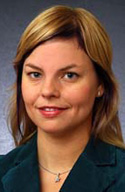 |
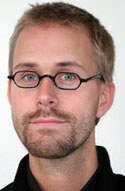 |
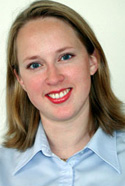 |
| Kristine Höglund, Isak Svensson and Louise Olsson. | ||
Dr. Kristine
Höglund defended her doctoral dissertation called
”Violence in the Midst of Peace Negotiations:
Cases from Guatemala, Northern Ireland, South Africa and Sri Lanka”,
partly related to the conflict in Sri Lanka, on 3 December 2004. Faculty
opponent was Professor Roy Licklider, Rutgers University. Read
the abstract (as a pdf-file). The focus of her research has been the
role of violence in peace processes, and under what circumstances incidents
of violence tend to disrupt peace negotiations. More information on her personal
homepage.
In August 2005 Kristine Höglund was given
a SASNET planning grant for a new project on ”Mediators,
Monitors, and Donors: Nordic Involvement in the Sri Lankan Peace Process,
2000–2005”. More
information on the August 2005 SASNET grants.
Abstract: This planning grant will fund networking activities
in the planning of a research project that seeks to analyse the Nordic
involvement in the Sri Lankan peace process 2000–2005. In the planning
phase of the project we will involve a number of eminent scholars that
have specialized in the conflict in Sri Lanka – both in Sri Lanka
and in the Nordic research environments. Two networking activities are
suggested. Firstly, a research trip to Sri Lanka to discuss the involvement
of our local research partner Centre for Policy Alternatives (CPA) in
the project. Secondly, we plan a 2-day workshop that brings together scholars
in Sweden and other Nordic countries that have a special interest in the
Sri Lankan peace process. Our ambition is that this initiative will result
in a more permanent network for Swedish and other Nordic scholars working
on issues related to the Sri Lankan peace process.
Dr. Isak Svensson is involved in a research programme on International Mediation in Internal Armed Conflict, led by Prof. Wallensteen. He has
partly focused on Sri Lanka, mainly doing quantitative studies of the peace process
in Sri Lanka. Especially, he has studied Nordic Third-Party Intervention in Sri Lanka. In 2001 he published a report from a Minor Field Study (no
14), named ”Confidence Building Measures in Intrastate Conflicts:
Lessons from the 1994-95 Peace Process in Sri Lanka”, and he has published several other papers and articles on the issue, many in collaboration with Kristine Höglund. He is also Member of the International Working Group on Conflict Prevention, at the Folke Bernadotte Academy, a Swedish government agency dedicated to improving the quality and effectiveness of international conflict and crisis management, with a particular focus on peace operations. More information on his personal
homepage.
Isak Svensson
defended his doctoral dissertation entitled ”Elusive Peacemakers: A Bargaining Perspective on Mediation in Internal Armed Conflicts” on 12 January 2007. It deals with the role of conciliatory
signals in ending armed, intrastate conflicts with negotiated settlements. Read an abstract of the thesis, with a link to the full text. ![]()
Dr. Louise Olsson is a researcher and project leader at the Folke Bernadotte Academy, and at the Department of Peace and Conflict Research, Uppsala University. Her research focuses on Peace operations and their effects for the local population, looking specifically at issues relating to UN Resolution 1325 (2000). In addition to her research, Olsson has conducted projects and arranged seminars relating to the implementation of Resolution 1325. For example, she contributed to the joint UNDPKO and Folke Bernadotte Academy ”Gender adviser seminar: Increasing dialogue and collaboration between the UN and Regional organizations” held in New York in April 2009. More information on her personal web page.
Louise Olsson has been involved in research on the situation in Afghanistan. In May 2009, she co-edited (along with Johan Tejpar, Development Economist at FOI) a Defence Analysis Report entitled ”Operational Effectiveness and UN Resolution 1325 – Practices and Lessons from Afghanistan”, on behalf of the Swedish Defence Research Agency, FOI. It is an analytical framework that has been developed and applied on five different Provincial Reconstruction Teams (PRTs) engaged in Afghanistan; the Dutch PRT in Tarin Kowt, the Italian PRT in Herat, The New Zealand PRT in Bamyan, the Norwegian PRT in Meymaneh and the Swedish PRT in Mazar-e Sharif. The work with the project was led by Dr. Louise Olsson, and was carrie dout during the period September 2008 to May 2009. Read the full report.
In November 2009, Dr. Olsson was awarded SEK 3.6 m as a three-years research grant (2010–12) from the Swedish International Development Cooperation Agency, Sida, for a project entitled ”Opportunities and Obstacles: Local Ownership of Development and Stability in Northern
Afghanistan”. More information about the 2009 Sida grants.
Abstract: This three-year project, led by Louise Olsson, identifies and analyzes the opportunities and obstacles in creating development and stability through local ownership with international support in Afghanistan. In focus is the international approach to work strategically to strengthen the structure, influence and effectiveness of the Government of the Islamic Republic of Afghanistan in the areas where Sweden plays an important role for the development and security, namely the Northern Afghan provinces of Balkh, Samangan, Jowzjan and Sar-e Pol. This project is conducted at Folke Bernadotte Academy. ![]()
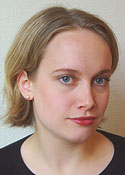 Jannie Lilja (photo to the right) has a research interest focusing on the dynamics of armed conflict, rebel motivation, strategy and collective action, non-state party negotiation, social networks, civilian-rebel group relationship, and civilians in armed conflict in Asia and Africa. During the period 2007–08 she worked as Conflict Transformation analyst for the World Bank, and during the same period she carried out research fieldwork in Sri Lanka. More information on her personal web page.
Jannie Lilja (photo to the right) has a research interest focusing on the dynamics of armed conflict, rebel motivation, strategy and collective action, non-state party negotiation, social networks, civilian-rebel group relationship, and civilians in armed conflict in Asia and Africa. During the period 2007–08 she worked as Conflict Transformation analyst for the World Bank, and during the same period she carried out research fieldwork in Sri Lanka. More information on her personal web page.
On Wednesday 12 May 2010, she defended her doctoral dissertation entitled ”Disaggregating Dissent: The Challenges of Intra-Party Consolidation in Civil War and Peace Negotiations”, partly dealing with Sri Lanka. The faculty opponent was Elisabeth Jean Wood, Professor of Political Science at Yale University, USA. The thesis includes a chapter on ”Trapping Constituents or Winning Hearts and Minds?: Rebel Strategies to Attain Constituent Support in Sri Lanka”, previously published as an article in the Terrorism and Political Violence journal in 2009.
Abstract: Contemporary civil wars are often characterized not only by fighting between rebels and governments, but also by rebel violence against their own community members. In spite of repeated peace negotiations, many of these conflicts seem to go on endlessly. Such instances may reflect attempts or failures on the part of the non-state side to consolidate. To confront the government on the battle field or at the negotiation table, rebels need to become an effective fighting force as well as effective negotiators. So, what do rebels do to consolidate to wage war and negotiate peace? The dissertation approaches the question of rebel capacity by disaggregating the non-state side in civil war and in connection with peace talks. The dissertation offers a set of original case studies from three ethno-separatist conflicts: Sri Lanka, Indonesian Aceh, and Senegal. More information, incl. link to full-text dissertation.![]()
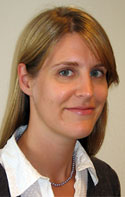 |
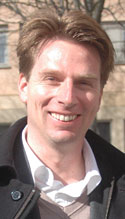 |
| Kristine Eck and Joakim Kreutz. | |
Kristine Eck has worked on a project on the armed conflict in Nepal between the government and the maoist guerilla till 2007. Fieldwork was undertaken February-March 2007 in Nepal, during which government officials, Maoist rebel leaders, UN officials, journalists, academics, diplomats, and members of various civil society organizations were interviewed. Her research primarily focuses on understanding the growth of the Maoist organization; other topics included the ongoing peace process, constitutional reform, upcoming elections, ethnic and Madhesi rights, and international involvement in Nepal. During the period April-May 2008, she again visited Nepal to do complimentary fieldwork. See her personal web page.
In 2009, she contributed with an article entitled ‘Recruiting Rebels: Indoctrination and Political Education in Nepal,’ in Mahendra Lawoti and Anup Pahari, eds. ”The Maoist Insurgency in Nepal: Dynamics and Growth in the 21st Century” (London: Routledge).
Kristine Eck defended her doctoral dissertation entitled ”Raising Rebels: Participation and Recruitment in Civil War” on Saturday 5 June 2010. The faculty opponent was Stathis Kalyvas, Arnold Wolfers Professor of Political Science and Director of the Program on Order, Conflict, and Violence at Yale University, USA.
More information, incl. abstract.
In November 2010, Dr. Kristine Eck was given SEK 1.7 m as a post-doc scholarship from the Swedish Research Council, to carry out a project entitled ”Women at War: Explaining Differential Levels of Female Participation in Rebellion” – partly focusing on Nepal – during the period 2011-12. The project will be carried out at the Swedish National Defence College (Försvarshögskolan) in Stockholm, which means Kristine will move over to this institution. ![]()
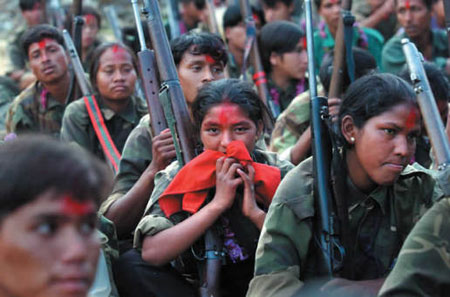 Project abstract: The aim of this project is to answer the question: why do levels of
female participation in rebellion vary? Some rebel groups discourage
female participation, while in others women compose a majority of the
troops. Almost all previous research has failed to address why this
variation occurs, probably because warfare is still assumed by most
Project abstract: The aim of this project is to answer the question: why do levels of
female participation in rebellion vary? Some rebel groups discourage
female participation, while in others women compose a majority of the
troops. Almost all previous research has failed to address why this
variation occurs, probably because warfare is still assumed by most
researchers and practitioners to be an exclusively male activity.
Without understanding what explains differential levels of female
participation in rebellion, researchers will retain a flawed and
incomplete conception of armed conflict and practitioners will find
that their policies create negative externalities for the female
population. The handful of studies on this topic which have addressed
female participation are historical narratives that examine only cases
where there have been high levels of female participation in
rebellion.
This project thus advances the study of female
participation in two ways. First, it suggests a number of new
theoretical avenues, namely, explanations built on culture,
developmental psychology, and characteristics of the armed conflict.
Second, it will test these theoretical explanations with a comparative
study of five different armed conflicts in which there is variation in
the level of female participation. This will allow the study to be the
first to employ the type of systematic, comparative methodology needed
to draw inferences.
Research assistant Joakim Kreutz has an
M.A. in Political Science from Uppsala University. He is working on conflict dynamics and strategic behaviour; communal violence and deliberate targeting of civilians; the termination and recurrence of political violence; and regional organisations as third parties. His field of interest has been mainly Southeast Asia, the Middle East, and Latin America, but recently he has also started to focus on South Asia, especially Pakistan. See his personal web page.
 Mr. Manish Thapa (photo), Regional Coordinator for the South Asian Regional Cooperation Academic Network (SARCAN) based in Kathmandu, Nepal, received the Robert McNamara Fellowship from the World Bank which made it possible for him to work on his doctoral dissertaion project entitled ”From Bullet to Ballot:
The Politics of Peacemaking in Nepal” at the Dept. of Peace and Conflict Research, Uppsala University, during the period January – June 2010. His supervisor was Professor Thomas Ohlson.
Mr. Manish Thapa (photo), Regional Coordinator for the South Asian Regional Cooperation Academic Network (SARCAN) based in Kathmandu, Nepal, received the Robert McNamara Fellowship from the World Bank which made it possible for him to work on his doctoral dissertaion project entitled ”From Bullet to Ballot:
The Politics of Peacemaking in Nepal” at the Dept. of Peace and Conflict Research, Uppsala University, during the period January – June 2010. His supervisor was Professor Thomas Ohlson.
Mr Thapa has previously been a Visiting Fellow at the Kroc Institute for International Peace Studies, University of Notre Dame, Indiana, USA.
Indian Guest lecturer at the department
In August 2008, SASNET awarded a guest lecture programme grant to Prof. Ashok Swain. He was given SEK 20 000 in order to invite Prof. K V Raju, Professor Head of the Centre for Ecological Economics and Natural Resources, Institute for Social and Economic Change (ISEC) in Bangalore, India. He was co-invited by the Dept. of Archaeology, Conservation and History, University of Oslo, to give lectures there as well. More information about the SASNET planning grants 2008.
Due to unforeseen reasons, Prof. Raju could not come to Sweden. Instead SASNET permitted the grant to be used to invite Dr. D. R. Sahoo, Professor of Sociology, Ravenshaw University, Orissa, India, to participate in the World Sociological Congress held in Gothenburg, July 2010. This was also done.
SASNET - Swedish South Asian Studies Network/Lund
University
Address: Scheelevägen 15 D, SE-223 70 Lund, Sweden
Phone: +46 46 222 73 40
Webmaster: Lars Eklund
Last updated
2011-05-19
